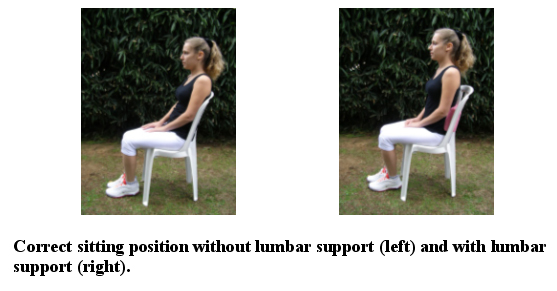What is the correct sitting position?
- Sit up with your back straight, think tall and your shoulders relaxed. Your buttocks should touch the back of your chair.
- All three normal back curves should be present while sitting. A small, rolled-up towel or a lumbar roll placed in the small of the lower back can be used to help you maintain the normal curvatures in your back.
Here's how to find a good sitting position when you're not using a back support or lumbar roll.
- Sit at the end of your chair and slouch completely.
- Draw yourself up and accentuate the curve of your back as far as possible. Hold for a few seconds.
- Release the position slightly (about 10 degrees). This is a good sitting posture.
- Distribute your body weight evenly on both hips.
- Bend your knees at a right angle. Keep your knees even with or slightly higher than your hips. (Use a foot rest or stool if necessary). Your legs should not be crossed.
- Keep your feet flat on the floor or foot rest.
- Try to avoid sitting in the same position for more than 30 minutes.
- At work, adjust your chair height and work station so you can sit up close to your work and tilt it up at you. Rest your elbows and arms on your chair or desk, keeping your shoulders relaxed.
- When sitting in a chair that rolls and pivots, don't twist at the waist while sitting. Instead, turn your whole body.
- When standing up from the sitting position, consciously put your abdominal muscles into gear and move to the front of the seat of your chair. Stand up by straightening your legs. A slight forward bend without slouching is fine.
- Immediately stretch your back by doing 10 standing backbends.

Table of Contents
- What should I know about Posture?
- What stabilizes the spine?
- How does Poor Posture happen and what are the consequences?
- What does good Posture look like?
- What are the benefits of good posture?
- What function does the CORE have?
- What are the basic requirements for proper posture?
- What contributes to bad posture?
- What is meant by Body Mechanics and Ergonomics?
- What are the essentials of good body mechanics?
- What should I know about Purses, Backpacks and Briefcases?
- What are the correct positions for stooping, squatting and kneeling?
- What is the correct sitting position?
- What is the correct driving position?
- How can I lift items safely?
- What is the best position for sleeping and lying down?
- Do I have to be continually aware of my Posture?
- What about doing a quick simple Mirror Test?
- What is the CORE of the body?
- Which Vertebrae relate to what sections of the body?
- What is the Central Nervous System (CNS)?
- Is there a recommended Stretching Routine for Seniors?
- Is there a recommended Warm-Up Routine for Seniors?
- Is there a recommended Exercise Routine for Seniors?
- What does the NIH recommend regarding EXECISE FOR THE ELDERLY?